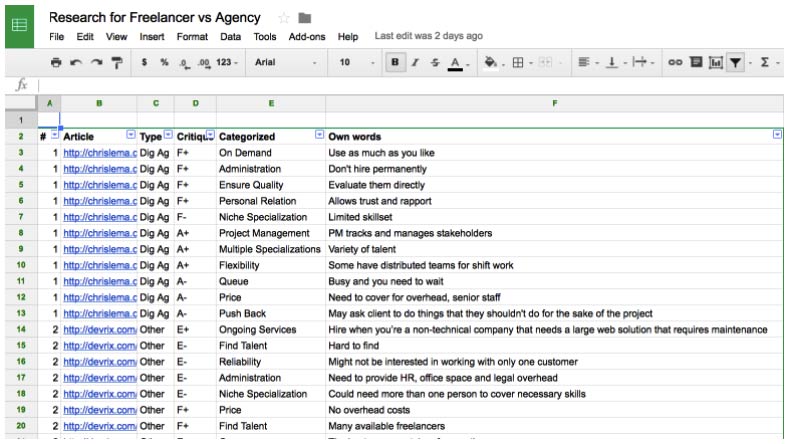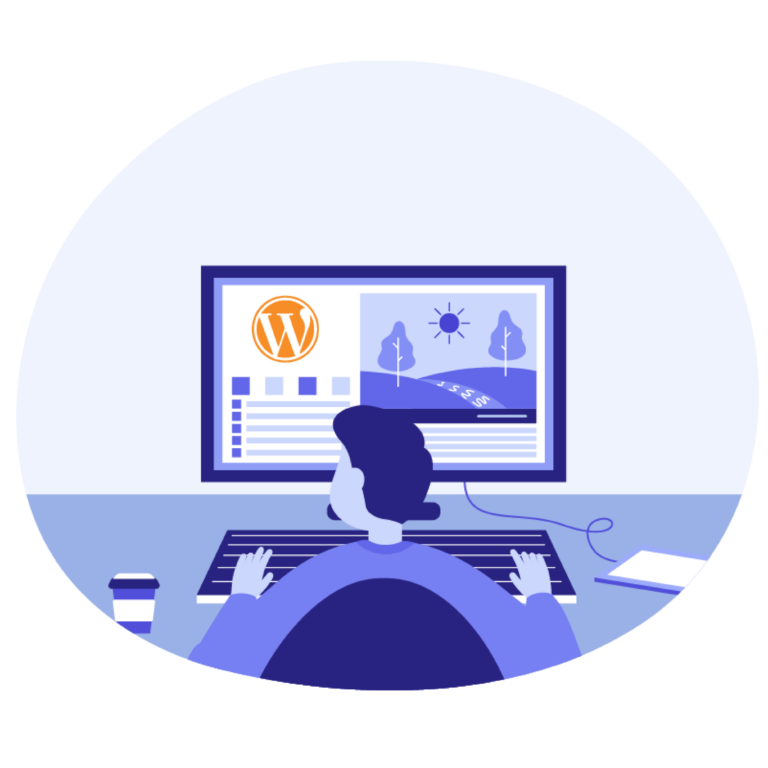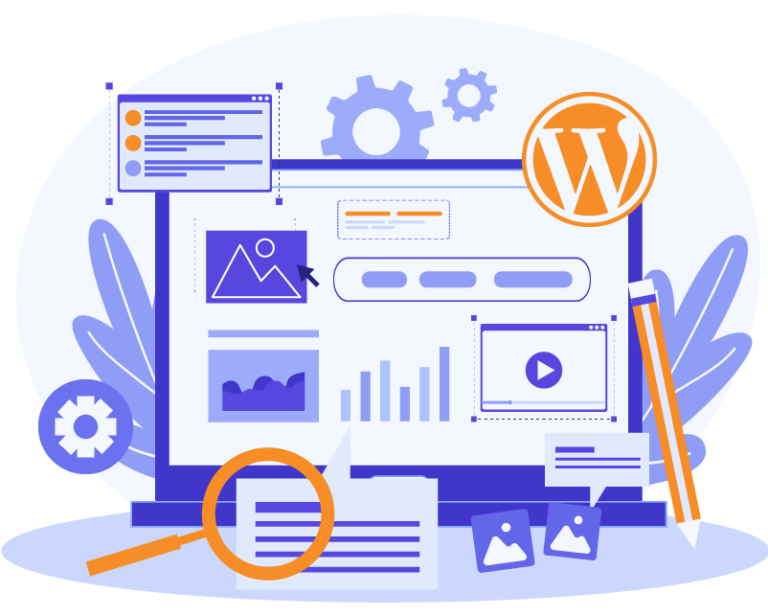“How do I choose between hiring a WordPress freelancer or hiring an agency to do the design and development of my website?”. This is a question that many business owners are asking themselves.
Consequently, there’s a plethora of articles that cover the topic. Since most of them are accounts of their authors’ own experiences and opinions, I thought it would be useful to bring their insights together in a summarizing article.
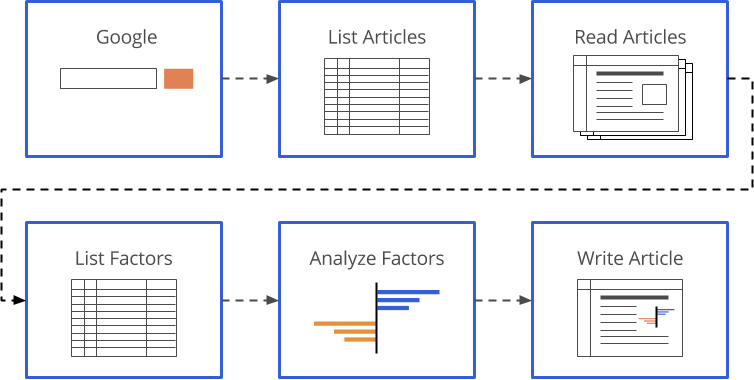
So, I reviewed and analyzed 16 of the highest ranking ones in Google to find the most important factors that influence the decision between a freelancer and an agency and how these benefit one or the other. Click here if you’re eager to see the list of articles that were reviewed.
While I represent a WordPress outsourcing agency and therefore have a biased perspective, I also have a background in research (“Dr. Corin Stig”) and I made efforts to stay objective. You can repeat the work yourself and see if you come to the same conclusions. The figure shows the process I used, and the full method is described at the bottom of the article.
Factors to Consider When Choosing a Freelancer or Agency
First of all, it is interesting to see what factors experts around the web are bringing up most frequently. Those are likely to be the most relevant aspects to consider for business owners deciding between working with an agency or a freelancer. The figure below shows the most common factors mentioned in the 16 reviewed articles (number of mentions in brackets), and how often they are mentioned as an advantage of a freelancer or agency respectively. The remainder of this section discusses each factor one by one in depth.
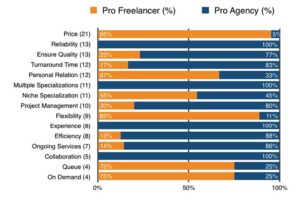
1. Price (21 Mentions)
How much does it cost? The most commonly mentioned factor for the choice between a freelancer and an agency. In almost all cases, the Price or cost is mentioned as the main benefit of working with a freelancer. Partly because they don’t need to cover for any overhead costs, and partly because there is high competition between freelancers that drives the prices down. Some smaller agencies argue that there’s not much difference between a small agency and a freelancer, but that larger agencies will be much more expensive.
For small businesses and startups, the cost is a more important factor than for larger businesses. Thus, several sources recommend freelancers as an option for small companies that cannot afford agency prices.
For more information about website costs, I wrote another article about the costs of getting a WordPress website built, from both the end customer’s and the digital agency’s perspective.
2. Reliability (13 Mentions)
The second most mentioned factor is Reliability. Many authors seemed to have experienced, or heard of, cases when freelancers suddenly disappeared or got jammed with another project.
Having a “single point of failure” is too high of a risk for many larger companies. The reviewed articles unanimously praise agencies for higher reliability, based on two main reasons. Firstly because of the stability of having an established company to work with. Secondly because by having more employees, the agency can cover when someone goes on vacation or sick-leave.
3. Ensure Quality (13 Mentions)
The factor Ensure Quality is related to reliability, but focuses on the work itself. Most mentions relate to how agencies are better at using established processes and industry best practices. Others discuss the limits of freelancers’ abilities in areas that are not their focus niche. Additionally, it can be a daunting task to select the right freelancer. While there are many talents out there, the pool of available freelancers is huge, and many are beginners who are just starting out and want to make some extra money.
However, some articles also promote this factor as an advantage for freelancers over agencies. They argue that freelancers (and small agencies) can be more free and creative than the bigger agencies. A big agency may be following too rigid processes and be influenced by the opportunity to reuse old ideas, limiting their ability to come up with new and unique ideas.
4. Turnaround Time (12 Mentions)
Most articles agreed that agencies can turn around a project faster than a freelancer. The two main reasons given were experience and being able to run activities in parallel with multiple team members to speed up the process. Also, lead time can suffer in a freelance setup with more than one person involved, due to the communication and collaboration between people who don’t know each other.
In an agency, on the other hand, the team is used to working together and are normally working in the same office to facilitate meetings and face-to-face communication. Even a freelancer himself mentions turnaround time as a drawback of working with a freelancer (Patrick Neve). The exception is Inkbot who argue that a freelancer can sometimes be a faster option, since one person is in charge of the project and doesn’t have to coordinate with other designers or developers.
5. Personal Relation (12 Mentions)
We’ve arrived at the second factor in favor of the freelancer, Personal Relation, although there are multiple sources claiming that the agency has an upper hand here too. Chris Lema writes that one of the main benefits of a freelancer is that it allows development of trust and rapport, which is seconded by other authors. Quick responses and loyalty are also mentioned as pros of working with a freelancer.
A subfactor that I chose to categorize under personal relations is the understanding for the customer’s brand and culture. The articles were mixed on this point, with some promoting agencies and others promoting freelancers as the best partners to fulfill this need.
6. Multiple Specializations (11 Mentions)
This factor is unanimously supporting the choice of an agency, since they can employ staff that together provide Multiple Specializations in a team setup. Two primary benefits from this factor are discussed.
The first one is the ability of the agency to provide an integrated solution to the customer’s needs. In many cases they come for a website, but what they really need is to increase the top end of their sales funnel. And that requires investments also in other marketing efforts. A digital agency can provide services in SEO to make sure the site ranks on Google, ad banners and social media presence to increase the visibility of the brand, and let a UX designer work on the website so it converts visitors into leads.
7. Niche Specialization (11 Mentions)
Here’s the flip side of the previous factor: Niche Specialization. While the agency can excel at having many different specialists on staff, many freelancers dedicate all their time and effort to perfect a particular skill, e.g. graphic design or WooCommerce projects. This plays in their favor, since many times a company needs help with something very specific.
8. Project Management (10 Mentions)
Multiple credible sources that I reviewed made it clear that one of the main benefits of working with an agency is that they provide Project Management. A team of professionals is usually needed to fulfill all the expertise needed in a project, and if you work with a group of freelancers then you can expect to spend quite a bit of time and headache on coordinating them yourself.
If you go to an agency, on the other hand, there will be an experienced project manager who knows the team, follows a vetted process and will be accountable for bringing you results. Unless they have an internal project manager for marketing, this is surely one of the main factors businesses will look to for ensuring the success of their projects.
9. Flexibility (9 Mentions)
Flexibility is another winner for the freelancers, a factor that can mean different things in general but has a very specific definition here. Articles written by both agencies and freelancers agree that a freelancer will be more flexible in terms of working hours and visits. If you work with an agency, they will probably not have anyone on-call if you have a request or question after business hours and you will likely need to visit them if you want face-time.
In contrast, a freelancer will typically be open to coming to you for meetings (as long as they work somewhere in the area) and are responsive on their phones and emails during evenings and weekends too.
10. Experience (8 Mentions)
Back to one of the strengths of agencies: Experience. By having conducted many different projects, and seeing them through to evaluate the results, an agency will be able to avoid pitfalls and draw from experience to suggest proven solutions.
A clear example of how this can be beneficial is how many agencies target one particular industry and become the go-to agency for those businesses. We call those “verticals”, and we’ve seen it work really well. Often these agencies specialize in digital marketing and know how to make e.g. orthodontists rank high on Google and reach their target audience.
A recommendation when choosing an agency is to ask them if they have experience working with companies in your industry.
11. Efficiency (8 Mentions)
All sources but one that mention Efficiency do so in favor of agencies. The agency can provide better efficiency by working with established processes, deploy a team that is used to working together and (as mentioned earlier) run processes in parallel.
However, the two freelancers themselves argue that they are efficient as well. They don’t need to adhere to processes or coordinate with other team members, and are motivated to get the job done so they can continue on their next project.
12. Ongoing Services (7 Mentions)
Ongoing Services is often part of the agencies’ business models. All companies want to have repeat business, some influencers even claim that we’re now living in the “subscription economy”. The digital agencies are no exception, and there’s a good reason for it.
While building a website is a project with a start and a finish, marketing is an ongoing process. The wide array of services that agencies can deliver make them suitable for handling future campaigns for their customers. They can preserve the essence of the brand that they either designed themselves or inherited when they got the job to make the website. A website also requires ongoing updates and maintenance, which agencies often provide as a subscription.
Freelancers argue that this is a feature they provide as well, since they are even more dependent on the revenue from their customers. Their personal relation (an important factor as mentioned above) will also make them loyal and ready to help when there are new requests.
13. Collaboration (5 Mentions)
The factor of Collaboration goes hand in hand with two of the previous factors (Multiple Specializations and Project Management). When siding with the freelancer model, chances are you need to work with more than one if you want to apply best practices in all the aspects of your project.
This means you’ll have to take the role of coordinating them, and making sure that they collaborate well. With a distributed team of experts who aren’t used to working with each other from before, this can be quite the challenge. Besides being a weakness of the freelancer setup, collaboration is also mentioned as a strength for agencies who can use the collaboration between their team members to bring about better ideas.
14. Queue (4 Mentions)
Although the factors are similar, I decided to separate the previously mentioned factor Turnaround Time from Queue since they affect your experience differently. By queue, I mean the time it takes before the project can start, while turnaround time is the time it takes from start to finish.
Three out of four articles mention this as a drawback of working with agencies. My assumption is that the business model of an agency with more overhead requires a schedule filled with billable hours to a greater extent than does the freelancer’s. However, a fourth article warns that while there are many freelancers ready to take on your projects, the queue for the best ones tends to be very long.
15. On Demand (4 Mentions)
With short start and stop time, working with a freelancer has the benefit of being the most On Demand option according to the reviewed articles. When you need work done, you reach out and you pay for the hours spent. Even small projects can be fitted into the schedule of a freelancer, while the overhead cost and additional planning required for working with an agency typically makes it inconvenient to assign them just a few hours of work.
However, there’s nothing keeping you from having an agency ready on demand as well. This is how we work with most of our customers. They can send us a PSD to WordPress project of 16-32 hours, but we also accept jobs of 4h from our steady partners. I’m sure most agencies would say the same, that they’re easy to work with on demand once the relationship has been established.
Conclusion: Is a Freelancer or Agency the Right Decision For You?
There are many factors to consider when making the choice between working with a freelancer or an agency for web development projects. I listed the 15 most mentioned factors and how frequently they were used to promote each option respectively.
When to Choose a Freelancer
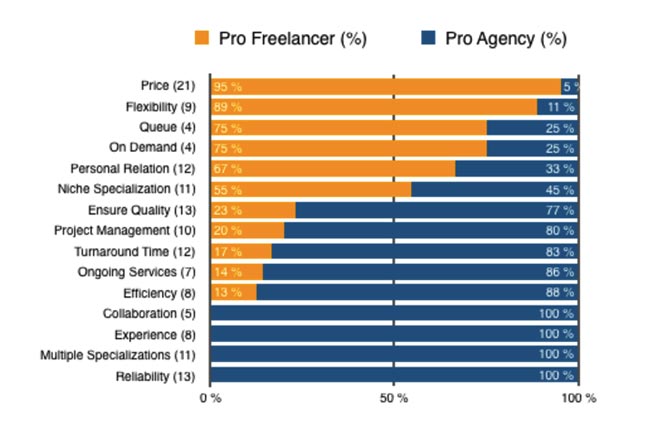
My conclusion from reviewing the articles is that there are two main scenarios when a freelancer is a way to go:
- Small businesses on a budget
By far the most recognized benefit of working with a freelancer in the reviewed articles was the lower price. A freelancer seems to be a good choice for small companies and entrepreneurs who have a limited budget, want someone to understand their business (which might not be so clearly defined yet in terms of marketing message) and give a lot of personal attention by visits to their offices and being available to answer questions and bounce new ideas off of. - Specialist needed
The second case is when a business needs an expert with a particular specialization for a project. Going to an agency would make vetting of the expert a bit trickier and they would likely want you to sign up for more services. It could also be the better option when a specific task is needed from time to time, and when affordability is prioritized over reliability or turnaround time.
That being said, there are really skilled freelancers who basically work like “one-person-agencies”, and who successfully serve larger clients too with a network of specialists involved. For instance, we do the WordPress development on a regular basis for several such mini-agencies.
When to Choose an Agency
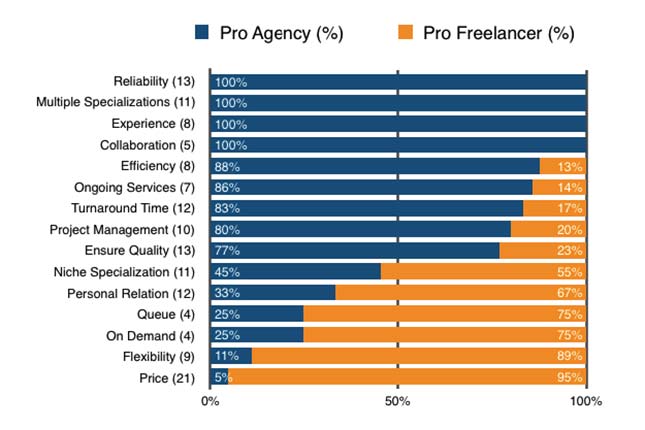
In cases other than the two above that favor freelancers, choosing an agency seems to be the best option. The additional money spent will partly go to overhead of the agency, but the specialization and experience of the agency will likely increase the value of the result as well as maximize return on the investment over time. Here are two scenarios that especially favor choosing an agency:
- Integrated solution for digital marketing
A business that is looking to get professional assistance for more than one aspect of their marketing efforts will benefit from working with an agency that has multiple specialists on staff. Projects can be managed within the agencies to bring about efficiency and good coordination between the various experts involved, while leaving you as a client focused on your own business. Future support can also be seen as part of the integrated solution, where you can start with a website and then add services as needed further on. - Leverage on agencies’ experience
Businesses that can afford to invest in long-term returns from their marketing efforts and who know that time is money are also likely to choose to work with an agency over freelancers. With a bit more money to invest and less time to spend looking for a good solution, larger businesses would opt for the reliability and professionalism of an agency. Thereby, they can leverage on the agency’s experience to make sure they’re not shooting in the dark with their marketing efforts. With an agency, they can also be sure to have their backs covered during the entire project and in the future.
Hope you enjoyed the article!
If you like the article, please share it with your friends or readers if you want to use it as a reference.
Thank you for reading, and best of luck with your project!
References
- Bannersnack – Freelancer & Design Agency. Who wins the battle?
- Chris Lema – How to Choose Between a WordPress Agency or Freelancer?
- Devrix – Employee vs. Freelancer vs. Agency
- Executionists – Online Agencies vs. Freelancers vs. Staff – Which is Best?
- GO-Gulf – Web Design and Development Company vs Freelancer – Which One Should You Opt For?
- GV Library – How to Choose the Right Design Agency for Your Startup
- Hubstaff – Secrets to Finding Affordable WordPress Development
- Inkbot Design – Should you Hire a Design Agency or a Freelancer?
- Kalexico – Web Design Agency vs Freelancers
- Lockedown Design – Should You Hire a WordPress Consultant or Freelancer?
- Patrick Neve – The Freelancer vs The Agency: Which Is the Better Option?
- StickOutSocial – Freelancer vs Agency
- ThinkSEM – Freelancer, Web Company or Ad Agency?
Appendix: Method
True to my background in research, I want to present how the data for this article was found and analyzed. It’s primarily useful to evaluate the credibility of the conclusions, and to find answers to why your own experience might be different from the cases I’ve studied.
In order to gather relevant articles on the topic, we searched Google for articles that help people choose a freelancer, or to choose between a freelancer or an agency, for their WordPress development or WordPress design. Examples of keywords used: pros and cons, what to think about, common mistakes, reasons to choose, difference between, benefits.
We compiled a list of 50 articles, and then sorted them according to Domain Authority to get an additional relevance metric besides ranking high on Google for the keywords used.
The top 16 were mostly digital agencies that were either trying to make an objective comparison of the pros and cons of freelancers and agencies, or promoting the agency model with sharp criticism of the use of freelancers. To complement the list, we also chose an additional article written by a freelancer that came lower in the list when sorted on Domain Authority.
The resulting list of 16 articles were written by: digital agencies (9), freelancers (2), and other (5). The category “other” includes an outsourcing agency, a platform for freelancers and agencies, a banner company, a coworking space, and an investment company.
Even if WordPress is our specialization and the favorite platform for most agencies and freelancers, the analysis and conclusions of this article are not limited to that CMS. Some of the reviewed articles focus specifically on WordPress, while others are more generic.
Below are the top 15 factors being mentioned and the number of times they are mentioned.
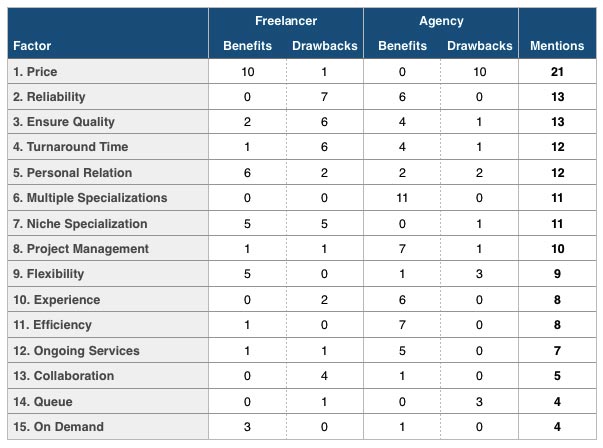
The 16 articles were read and pro/con statements for freelancers and agencies were extracted into a list. The list was then analyzed for patterns of recurrent types of items, which resulted in a categorization of 22 factors. For example, the statement “a freelancer might disappear halfway through” was codified as a con for freelancers on the factor “Reliability”.
